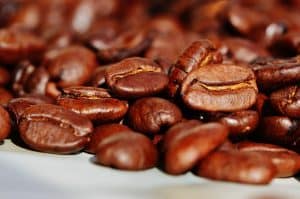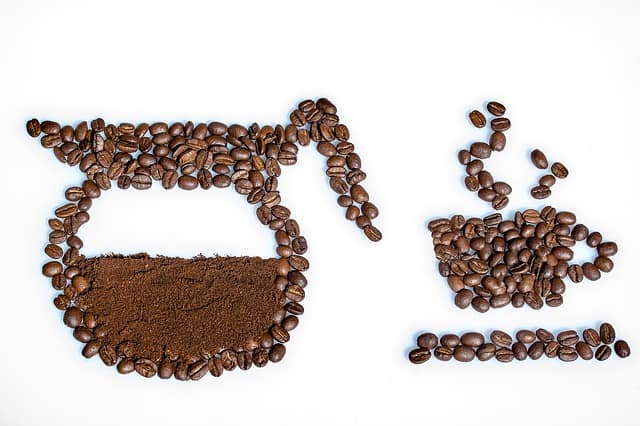Coffee – What are the health benefits of coffee?
You may have heard – study after study has shown that coffee has numerous health benefits. Why is that? There’s a lot of reasons – because coffee has a lot of good stuff in it, and we’ll go through them all here.
For many of us (around 85%, given the latest surveys), this is good news – so grab that fresh cup of coffee and continue reading. You can rest assured we’re drinking coffee as we write this too.

Coffee has caffeine that can improve your energy levels
This shouldn’t be a shock to anyone – coffee contains caffeine. Caffeine is a chemical compound that acts as a stimulant to the Central Nervous System (CNS). How does it do this? In the body (and specifically in the brain – after being absorbed via your blood stream) it blocks the action of adenosine, a neuromodulator that promotes sleep. When adenosine is blocked other neuromodulators such as norepinephrine and dopamine increase. All this means that the caffeine in your coffee can help make you feel less tired, improve your mood and energy levels, and make you more alert. It also seems to improve general cognitive function. And this isn’t just a placebo effect – one study showed that drinking caffeinated coffee improved performance measurably on a variety of tasks – day or night.
But there are some downsides to caffeine intake. First of all it is a drug. And that means you can develop a mild form of drug dependence – and that is associated with withdrawal symptoms such as sleepiness, headache, and irritability – when an individual stops getting their caffeine regularly. Similar to other drugs, you can also develop a tolerance for caffeine – which means you need more and more to obtain the desired effect. The effects of caffeine can also increase feelings of anxiety. Lastly, for some people having caffeine late in the day can disrupt their ability to fall asleep (but for others it seems to not be as big of a deal). For those that have issues with anxiety or sleep onset after drinking coffee, tea may be a good alternative. Tea has lower doses of caffeine, but studies show it can confer most of the same advantages of coffee. Also be aware that caffeine is a mild diuretic, it will promote the loss of fluids more readily than would occur otherwise.
When all is said and done though, for most people the benefits of caffeine outweigh the drawbacks.

Caffeine increases your metabolic rate – leading to increased fat burning
The caffeine in coffee also increases Epinephrine (also known as Adrenaline). This “fight or flight” hormone helps signal to the body that energy is needed – and this seems to promote the break down of fat for energy.
Combine these two factors, and you can see that coffee can be a potent fat-burning tool. And it’s a great idea to have a cup of coffee before you go to the gym. Think of it as the old school pre-workout.

How You Brew Coffee Is Important
There are different ways to brew coffee. Using a method that utilizes a paper filter is best. Present in the beans is a compound called cafestol that can increase your LDL (the bad cholesterol). Methods of coffee brewing such as French press, Turkish coffee, or Scandinavian “boiled” cafetiere will have higher levels of this compound.
Surprisingly High Vitamin, Mineral, and Antioxidant Content
Coffee is not just all about the caffeine though. It’s also got surprisingly high levels of several important nutrients, including:
- Riboflavin (Vitamin B2) – 11% RDA
- Pantothenic Acid (Vitamin B5) – 5% RDA
- Manganese – 3% RDA
- Potassium – 3% RDA
- Magnesium – 2% RDA
- Niacin (B3) – 2% RDA
Not bad, for a very low-calorie beverage. Again, we recommend keeping it as close to black as possible.
What antioxidants are contained in coffee?
- Caffeic acid
- Caffeine
- Chlorogenic acids
- Eugenol
- Gamma-tocopherol
- Isoeugenol
- P-coumaric acid
- Scopoletin
- Tannic acid
And you read that right – caffeine – which brings so many other great benefits is also an antioxidant.

Protect against disease
- Type 2 Diabetes
- Heart Disease
- Stroke
- Parkinson’s Disease
- Alzheimer’s Disease (and Dementia)
- Liver Cirrhosis
- Liver Cancer
- Colorectal Cancer
- Multiple Sclerosis
- Gout
In Summary
That’s an impressive list of benefits. So given that most people have minimal side effects from coffee and caffeine intake, having a few cups per day is not a bad idea.
Looking for another low-calorie, healthy beverage choice? Tea is also a antioxidant powerhouse – with low-calories and delicious taste.

References
- Investigation of the Effects of Coffee on Alertness and Performance during the Day and Night
- A naturalistic investigation of the effects of day-long consumption of tea, coffee and water on alertness, sleep onset and sleep quality
- Adenosine, Adenosine Receptors and the Actions of Caffeine
- Caffeine and the central nervous system: mechanisms of action, biochemical, metabolic and psychostimulant effects.
- Normal caffeine consumption: influence on thermogenesis and daily energy expenditure in lean and postobese human volunteers.
- Comparison of changes in energy expenditure and body temperatures after caffeine consumption.
- Can coffee prevent caries?
- Effects of caffeine on the metabolic and catecholamine responses to exercise in 5 and 28 degrees C
- Nutritional data – Coffee, brewed from grounds, prepared with tap water
- Intakes of Antioxidants in Coffee, Wine, and Vegetables Are Correlated with Plasma Carotenoids in Humans
- Contribution of beverages to the intake of lipophilic and hydrophilic antioxidants in the Spanish diet.
- The Cholesterol-Raising Factor From Coffee Berans

Tim is the founder of FitAtMidlife.com – an avid gym rat for 30+ years, he’s a reviewer of many, many shoes – and founder of the Speed Bag Gathering – the world’s only gathering of speed bag punching enthusiasts. See more gym reviews at Tim’s YouTube channel.

